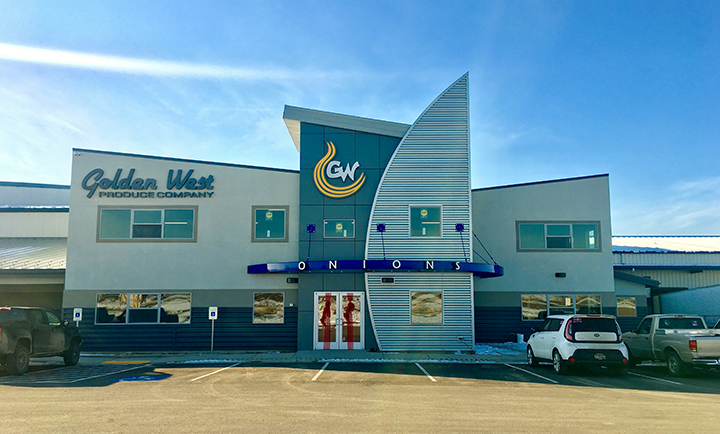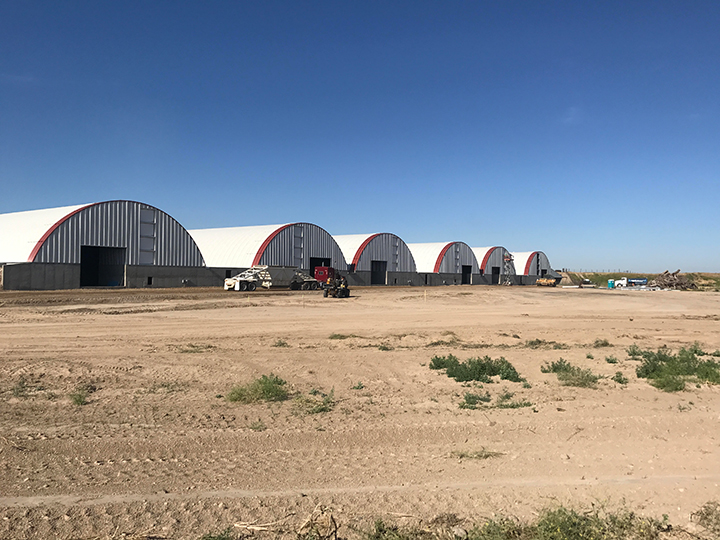By Denise Keller, Editor
Farmers and others in agriculture have generally proven to be a resilient bunch. During the past year, resilience has been essential for onion growers, packers and shippers in the Treasure Valley.
Last winter, more than 150 buildings in eastern Oregon and southwestern Idaho buckled under the weight of massive accumulations of snow and freezing rain that fell in December 2016 and January 2017. Onion storage sheds and packing facilities were among the losses.
One year later, the Treasure Valley onion industry is rebounding and rebuilding.
“Farmers are forever optimistic. The rule of thumb is it will be better next year,” says Paul Skeen, president of the Malheur County Onion Growers Association.
The snow and rain delayed planting of the 2017 crop by a month for Skeen and many other growers in the area. Yield and bulb size were down slightly, but quality was fabulous, which helped boost prices, he says.
Construction is ongoing in the valley, although it has been difficult to find electricians, plumbers and other tradesmen because so many people are trying to repair and rebuild at once.
Golden West Produce
Of the packer-shippers that sustained significant structural loss, Golden West Produce is one of the few back in full operation, says owner Troy Seward. During the second week of January 2017, the company lost six buildings in Nyssa, Oregon, including its production facility and multiple onion storages.
The Golden West team either had to quit or rebuild, and quitting wasn’t an option, Seward recalls. Company leaders quickly began the demolition process, secured an alternate packing facility to handle the remainder of the 2016 onion crop and immediately launched plans to rebuild. It helped that the company already had been planning to build additional storage buildings and a new production facility across the river in Idaho in the next three to five years.
“The storm became the impetus for us moving forward more quickly than what we had initially planned,” Seward says.
Golden West completed construction of three onion storages and a production facility in Parma, Idaho, in mid-November 2017. The production facility features a state-of-the-art packing line with an optical onion sorter/grader, an eight-lane cup sizer, automated baggers, robotic palletizers, and a hopper buffering system for increased packing flexibility and greater efficiency.
Although Seward feels that Golden West is poised to be stronger than ever with its new facility, the year following the collapse of the buildings has been the most stressful of his life. Making changes quickly and efficiently while trying to minimize the effects on the business and its customers was an unforeseen challenge.
“How we handle these moments is what we feel defines us and our attitude in business, and the lesson I feel like we’ve learned is that we have to persevere and move forward no matter what the consequences and the damages are,” Seward says. “Someone once told me that God never gives you more than you can handle, but He certainly put a lot on our plate at once to try to handle. And we feel like we’ve done a good job of trying to make it through a tough situation.”

Golden West Produce’s new Parma, Idaho, production facility includes a 65,000-square-foot packing facility and a 7,500-square-foot detached bin dumping/onion topper room. Photo courtesy Golden West Produce
Owyhee Produce
Owyhee Produce is also moving from Nyssa to Parma after losing three bin-storage facilities, one bulk-storage shed and 25 million pounds of onions last winter. Shay Myers, Owyhee Produce general manager, says “regulatory challenges made it hard to want to stay in Oregon.” Idaho seemed like a better fit and will allow the company to grow.
Construction of storage sheds to replace the collapsed structures was completed in mid-September. A new packing facility at the Parma site, which is one mile from the current location, is a few months from completion.
In the rebuild, Owyhee changed from bin storage to bulk storage in order to reduce labor requirements. The change allowed the company to increase the speed of operations during harvest with about one-quarter of the number of employees, according to Myers. The company also increased its storage refrigerated capacity from 25 percent to 60 percent in hopes that additional airflow and refrigeration in the bulk storage sheds will help maintain bulb quality later in the season.
“What has stood out this past year is the ability of our operation with our employees and our family to work together when it counts. We work together every day doing the status quo, but when it really counted and everyone had to give everything they had, everyone did,” Myers says.

Owyhee Produce’s new bulk storage sheds replace structures that collapsed under the weight of heavy snow last winter. Photo courtesy Owyhee Produce
Champion Produce
Champion Produce in Parma, Idaho, is in the thick of the rebuilding process. The company lost three facilities last winter. Construction of one storage building is complete, and work continues on two more.
“Rebuilding is a slow process, as you can imagine,” says Dallas Jensen, Champion Produce grower and industry relations manager.
The smaller crop in 2017 made the lack of storage buildings a non-issue for Champion Produce, according to Jensen. The company is not increasing its storage capacity as part of its new construction, but it has relocated the new buildings to make the flow of the facilities more efficient. Crews have also worked to reinforce and stabilize buildings that didn’t collapse in an effort to prevent additional collapses due to weakened structures. Overall, the company has attempted to make the best of a bad situation.
“I think that’s all you can do in any situation. It doesn’t do anybody any good to sit and sulk. Just move forward the best you can,” Jensen says.